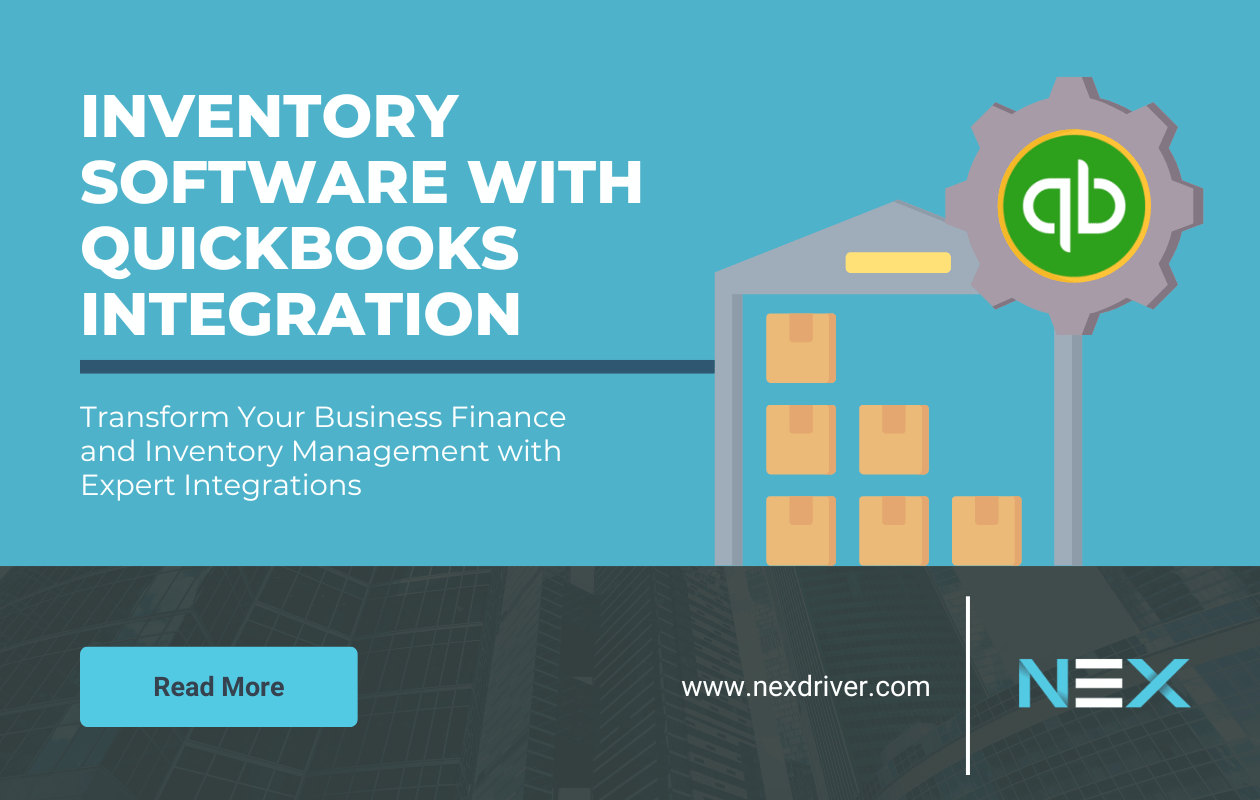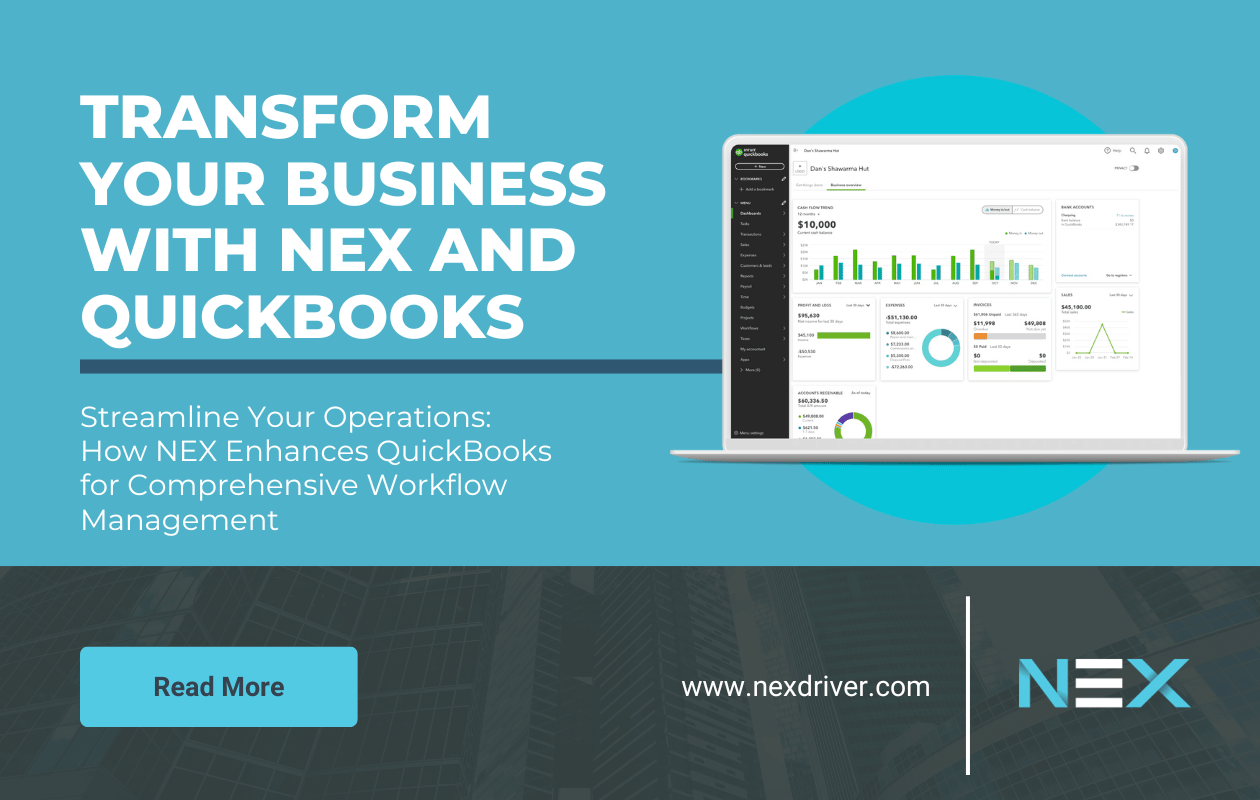1 min read
Best Inventory Management Software Integrations with QuickBooks
Integrating QuickBooks with specialized inventory management software is becoming a strategic decision for many businesses looking to enhance the...
5 min read
NEX Marketing : Mar 5, 2024 9:19:06 AM

Tech leaders in the finance sector are always looking for ways to improve their operations, aiming to boost both efficiency and financial outcomes. A key trend in this effort is the growing use of Business Management Software (BMS), particularly Enterprise Resource Planning (ERP) systems. By automating routine tasks, bringing data together in one place, and providing insights in real time, these systems help finance leaders make quick, informed decisions. This keeps their organizations competitive and flexible in a fast-changing market. The real challenge, then, is not just in adopting these technologies but in using them effectively to achieve operational excellence and drive financial growth.
TL;DR Summary: This blog post examines the critical role of Business Management Software, particularly ERP systems, in optimizing operations within the finance sector. Highlighting compelling statistics, it showcases how these technologies enhance operational efficiency, improve decision-making processes, and drive financial performance. The discussion is aimed at technology leaders seeking to navigate the complexities of financial technology adoption, offering insights into maximizing the benefits of ERP solutions for sustainable business growth.
Leveraging business management software is a necessary tool when it comes to enhancing the efficiency of your business processes. By automating repetitive tasks and centralizing data and information, BMS software eliminates the need for manual data entry, thereby reducing the risk of errors and saving valuable time. This increased efficiency not only enhances the accuracy of your operations but also boosts productivity within your organization.
The global ERP software market has been on a rise, with a 9% growth in 2022 alone, indicating increased adoption and the value businesses place on ERP solutions. This market is expected to surpass $49.5 billion by 2025. A notable 95% of businesses reported improvements in their business processes following ERP implementation, with 82% achieving ROI within their expected timeframe. These noteworthy improvements include reduced process times, increased collaboration, and centralized data systems, highlighting the efficiency gains from ERP systems
These stats highlight the transformative impact of business management software on operational efficiency, productivity, and profitability. By automating repetitive tasks, providing real-time insights into various business aspects, and facilitating informed decision-making, ERP and other business management systems play a crucial role in streamlining business processes and driving growth.
Furthermore, the real-time visibility provided by business management software offers a comprehensive insight into various facets of your business, including inventory, sales, and customer data. With the ability to easily track and monitor key metrics, you can swiftly identify bottlenecks and make well-informed decisions to streamline your processes further.
The effectiveness of decision-making is well-supported by the capabilities of business management software, particularly through the use of Enterprise Resource Planning (ERP) systems and Business Intelligence (BI) software. These tools are designed to consolidate data, automate business processes, and provide advanced data analysis capabilities, which are essential for making timely, well informed, data-driven decisions.
ERP systems, offer real-time data enabling decision-makers to have up-to-the-minute information on financial data, inventory levels, and customer interactions. This access to immediate and current information supports swift and accurate decision-making, helping businesses adapt to market changes, stay competitive and keep customers happy.
On the other hand, BI software adds substantial value by facilitating fast and accurate reporting, offering valuable business insights, and enabling competitive analysis. BI tools help organizations identify market trends, increase operational efficiency, and make improved, accurate decisions, which can lead to increased revenue and lower margins. The primary function of BI software is data analytics, helping companies analyze, manage, and visualize business data to support decision-making processes.
To harness the full potential of data for making business decisions, it's crucial to follow a structured approach. This involves defining business goals, identifying and organizing the relevant data aligned with these goals, establishing a data management strategy, selecting the right tools for managing, processing, and visualizing the data, and finally making decisions based on this data. Software tools like Microsoft Power BI and Tableau are highlighted for their effectiveness in supporting BI and analysis processes, centralizing data from all organizational departments, and facilitating the transformation of data into actionable information.
One of the key benefits of business management software is its ability to improve productivity across your organization. By automating manual tasks, eliminating paperwork, and providing a centralized platform for collaboration, it enables your employees to work more efficiently and focus on value-added activities.
Additionally, business management software often includes features such as task management, project tracking, and employee scheduling, which help streamline workflows and ensure that tasks are completed in a timely manner. This not only increases productivity but also improves accountability and transparency within your team.
Furthermore, business management software can integrate with other tools and systems, such as CRM and accounting software, further enhancing productivity by reducing the need for duplicate data entry and enabling seamless data exchange between different departments.
Business management software significantly enhances productivity by streamlining operations, automating routine tasks, and facilitating better decision-making.
Here's how these systems contribute to increased productivity:
1. Automation of Routine Tasks
By automating repetitive and time-consuming tasks, such as data entry, invoicing, and report generation, business management software reduces the manual effort required from employees. This automation not only speeds up processes but also minimizes the risk of human error, leading to more accurate and reliable data. As a result, employees can focus on more strategic, high-value tasks that require human insight and creativity, thereby increasing overall productivity.
2. Centralization of Data
Business management software centralizes data across different departments, making it easily accessible from a single platform. This centralization eliminates the need for multiple spreadsheets and systems, reducing data redundancy and improving data accuracy. With a unified view of business operations, employees can quickly access the information they need, leading to faster decision-making and more efficient workflow management.
3. Real-Time Insights and Analytics
These systems offer real-time visibility into various aspects of the business, including sales, inventory, and customer data. With built-in analytics tools, businesses can track performance metrics and identify trends, enabling managers to make informed decisions based on up-to-date information. This capability to swiftly respond to changing business conditions or identify areas for improvement contributes significantly to enhancing productivity.
4. Enhanced Collaboration and Communication
By providing a platform for sharing information and collaborating on projects, business management software breaks down silos between departments. Enhanced collaboration and communication ensure that everyone is on the same page, reducing delays and misunderstandings that can impede productivity. Additionally, some systems include project management and communication tools, further facilitating teamwork and efficient project completion.
5. Streamlined Business Processes
The automation and integration capabilities of business management software enable companies to streamline their business processes. By optimizing workflows and removing unnecessary steps, these systems reduce the time and effort required to complete tasks. This streamlining of operations not only speeds up the execution of business activities but also improves the overall agility of the organization, allowing it to adapt more quickly to market changes or operational challenges.
6. Improved Customer Service
With access to comprehensive customer data and history, businesses can provide more personalized and efficient customer service. This improvement in service quality can lead to increased customer satisfaction and loyalty, which indirectly boosts productivity by reducing the time spent on handling customer complaints and increasing the likelihood of repeat business.
Business management software plays a critical role in improving productivity by automating and optimizing business processes, centralizing data, providing real-time insights, enhancing collaboration, and improving customer service.
Business management software can have a significant impact on your financial performance by providing you with accurate and real-time financial insights. With features like accounting, budgeting, and financial reporting, it allows you to effectively manage your finances and make informed decisions to drive profitability.
By automating financial processes, business management software reduces the risk of errors and ensures that your financial data is always up to date. This enables you to track expenses, monitor cash flow, and generate accurate financial statements, giving you a clear picture of your financial health.
Furthermore, business management software often includes features for invoicing, billing, and payment processing, making it easier for you to manage your accounts receivable and accounts payable. This improves cash flow management and reduces the time and effort spent on manual invoicing and payment collection.
In revisiting the question of how businesses in the finance sector can refine operations to not only boost efficiency but also enhance financial performance, it becomes clear that the answer resides in the strategic deployment of Business Management Software.
To discover how NEX can transform your business operations and drive financial performance, we invite you to learn more through a personalized demo. Experience firsthand how the NEX platform can provide operational visibility and efficiencies tailored to your business needs. Visit us at nexdriver.com/modules to embark on your journey toward operational excellence and financial growth.

1 min read
Integrating QuickBooks with specialized inventory management software is becoming a strategic decision for many businesses looking to enhance the...

In the realm of B2B eCommerce, the management of orders plays a paramount role in ensuring buyer satisfaction. This article aims to explore means of...

Businesses leaders are always looking for ways to improve operations, aiming to boost both efficiency and financial outcomes. NEX offers a...